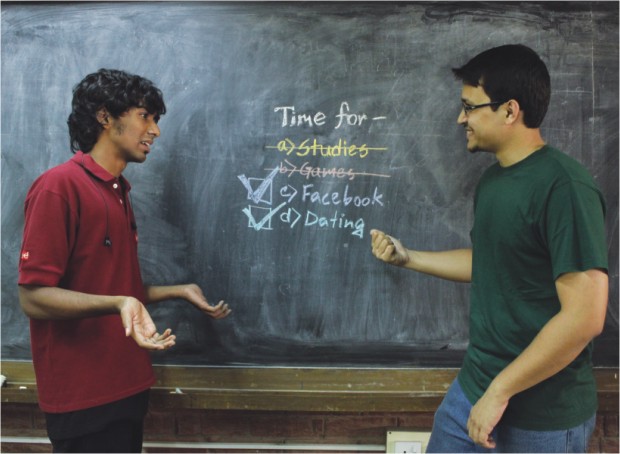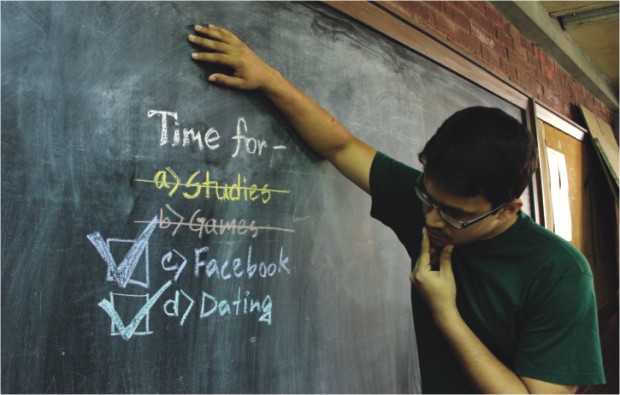| Spotlight

Social Networking:
Preaching or Poaching?
Fauzia Sultana
Photos: Kazi Tahsin Agaz Apurbo
Models: Sami Mahboob, Wassi Noor Azam
May 30, 2010 -- the day Facebook was temporarily banned in Bangladesh for uploading satiric images of some politicians, including the prime minister and the leader of the opposition. That was literally Doom's Day for us. Feeling almost handicapped in its absence, people tried the best possible alternatives, like installing the Tor (software), in an effort to clutch at a straw to save us from drowning.

The ever-changing priorities.
“I remember the time when Facebook was temporarily banned and I felt imprisoned! It is a wonder now since I am not a Facebook fanatic at the moment, at all. Right now, my activities on Facebook are rather slow and I find my friends to be on the same boat as well,” says Haseeb Rahman, an Advanced Level student from Maple Leaf International.
 |
Everyday we log on to Twitter
or Facebook to share our thoughts
and feelings -- sad or happy. |
Social networking is far beyond being trendy and has become a cultural phenomenon. We are surrounded by online social networking sites and platforms which make commuting and communicating as easy as clicking the mouse. Not having an account on Facebook or MySpace is like “Oh my god, you are anything but interesting and so out of the league.” Hundreds of millions of people have joined Facebook and Twitter, among others, and users have never had so many choices that require nothing more than a computer and an internet connection. Every day, we log on to Twitter or Facebook and share our information and feelings -- sad or happy. Though it is just virtual space and virtual activities, these social networks echo who we are: a Farmville fanatic or a creep with an identity crisis. But what is the value of these social networks? Why do we feel that we are missing out on something if we are not Facebooking or Tweeting? If social networking is affecting us in many ways and connecting over a cup of coffee seems long gone, question is why do people spend so much time on these social networks? The answer is simple. People are either 'social searching' or 'social browsing.' Surprisingly, pictures are the prime reason of 'social browsing' and most of the actions on Facebook or MySpace are related to viewing pictures or people's profiles without really having to pry into their lives. However, things change when it comes to Twitter.
Twitter restricts users to 140-character messages; the technology uses words without photos to communicate and those who are willing to put themselves out there publicly in words use Twitter.

Social networks are always within our hand's reach.
The advantages of social networking are real even though most of us see it as another way of wasting time. Through social networking, some of the positive outcomes include organising political activities, organising reading groups, announcements of campus activities and maybe even finding a job -- namely through Facebook, Linkedln and many more. Creating profiles on MySpace, making a video and posting it on YouTube, changing profile pictures on Facebook -- are reflections of one's identity, what one desires to become and what one's values, strengths, and weaknesses are. As the youngsters are prepared to enter the adult social world, the social networking environment online provides them with training wheels thus allowing the young people to interact more with others in the safety of their homes. Through social networking sites, young students are actually getting in touch with the skills apt for a global citizen of the 21st century, thanks to the availability of the tools and technology online.

 |
Social networking sites expose young people to elements outside their realms. |
Young people share their creative originals -- poetry, film, photography or just words and sentences expressing themselves, turning out to be absolute masterpieces. "It is through networks like Flicker and MySpace that uprising talents are brought to light," says Sami Sarfaraz, a member of the North South University Photography Club (NSUPC). “I am a member of an association called the Bangladeshi Photographers and take photographs frequently, which I upload as well. Flicker is an amazing platform, for beginners to photography-gurus! Through Flicker I am able to upload my art work and get people to criticise and also receive their positive feedback. I sometimes have a few of the well-known experts commenting on my work as well." Just like Sami, there are many other young talents out there who develop products, or maybe even just an idea, and are able to bounce them off with their online friends and other social networking contacts. One can also ask questions and receive answers immediately, if one is in contact with his or her teachers or other experts in the field. For those who suffer from disorders like the Social Anxiety Disorder or Asperger's syndrome, social networks are probably the remedy!
A question still remains. Does Facebook also disconnect us from each other? Instead of communicating with our loved ones in person or over the phone, we tend to send little ungrammatical notes or tagging them on photographs online. With an increasing habit of social networking, one can dispose relationships at the click of a mouse, delete his or her profile if one does not like it and swap an unacceptable identity in the blink of an eye for one that is more acceptable. “Facebook is a great means of keeping in touch. But it has its cons as well. Since it is operated by people, misuse of these networking sites, is obvious," says Taimur Rahman, a student of the Department of Chemical Engineering in BUET. "One such case occurred when a few of my classmates had received abusive posts from someone, who they had assumed to be a classmate. In reality, that person was a complete stranger and they had no idea how the stranger had found a place in their friend's list in the first place." Young people, who have

As youngsters prepare themselves for the adult social world, the social networking environment allows them to interact in the safety of their homes.
zero experience of a world without online societies, put less value on their real world identities and therefore, can be at risk. Companies continue to block social networks to stop the flow of malicious software, endangering their business security. Use of provocative or abusing words on Facebook or inflammatory, hate-filled videos on YouTube, not only overwhelms the efforts to promote tolerance and to teach diversity but also inspires violence.

Social networks are a big part in the lives of every young adult.

If social networking is affecting us in many ways and connecting over a cup of coffee seems long gone, question is why do people spend so much time on these social networks?
 |
Conflicting thoughts on which social network to use. |
While some may have been bullied online, many have also found their soul mates or have been victims of bank account hacking, it is always interesting to know how these parallel worlds have made a strong impact in the lives of the young and the old. “I am obsessed with weddings and the preparations involved and with the advent of the page 'Bangladeshi Bride Rock'z on Facebook,' my obsession is growing everyday! I love to spend hours clicking and going through the beautiful wedding stories through the artistry of photography,” says Nayeema Rahman, a student of the Department of Pharmacy from North South University.
Real-time social networking icons like Twitter and Facebook help spread the word about what is happening, in not just our friends' lives, but also in the lives of people living all over the world. Undoubtedly, these social networking sites are clearly fun and also expose young people to elements outside their realms. The sites work not only as friend-searching engines, but also as a platform to raise funds for calamity stricken countries like Japan. The social networking era is, for us, an interesting time, and as the Chinese proverb says: “May you live in interesting times, May you find what you are looking for.”
|
Copyright (R) thedailystar.net 2011 |

